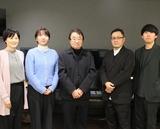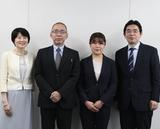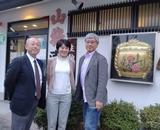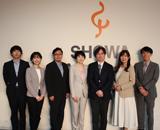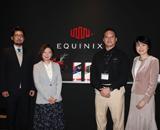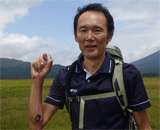February 2022
20 Years of Promoting a Data-based Approach to Economic Policies: RIETI's Desired Publicity for its Research
The Research Institute of Economy, Trade and Industry (RIETI) is a policy think tank established in 2001 with a mission to propose economic policies based on quantitative and statistical data. It conducts research that integrates the arts and sciences and transcends the boundaries of each field--as it has done for COVID-19 measures, for example--and promotes evidence-based policy making (EBPM). The organization's work, based on over 20 years of research, has been highly praised, both in Japan and abroad, and dubbed the "Intelligence Platform of Kasumigaseki." Arc Communications has been involved in designing RIETI's quarterly public relations magazine, RIETI Highlight, since 2007. For this issue, we sat down with members of RIETI, and Chairman Yano made time out of his busy schedule to join us too. We talked about a broad range of subjects, ranging from RIETI's fundamental principles to the editorial policies of their public relations magazines.
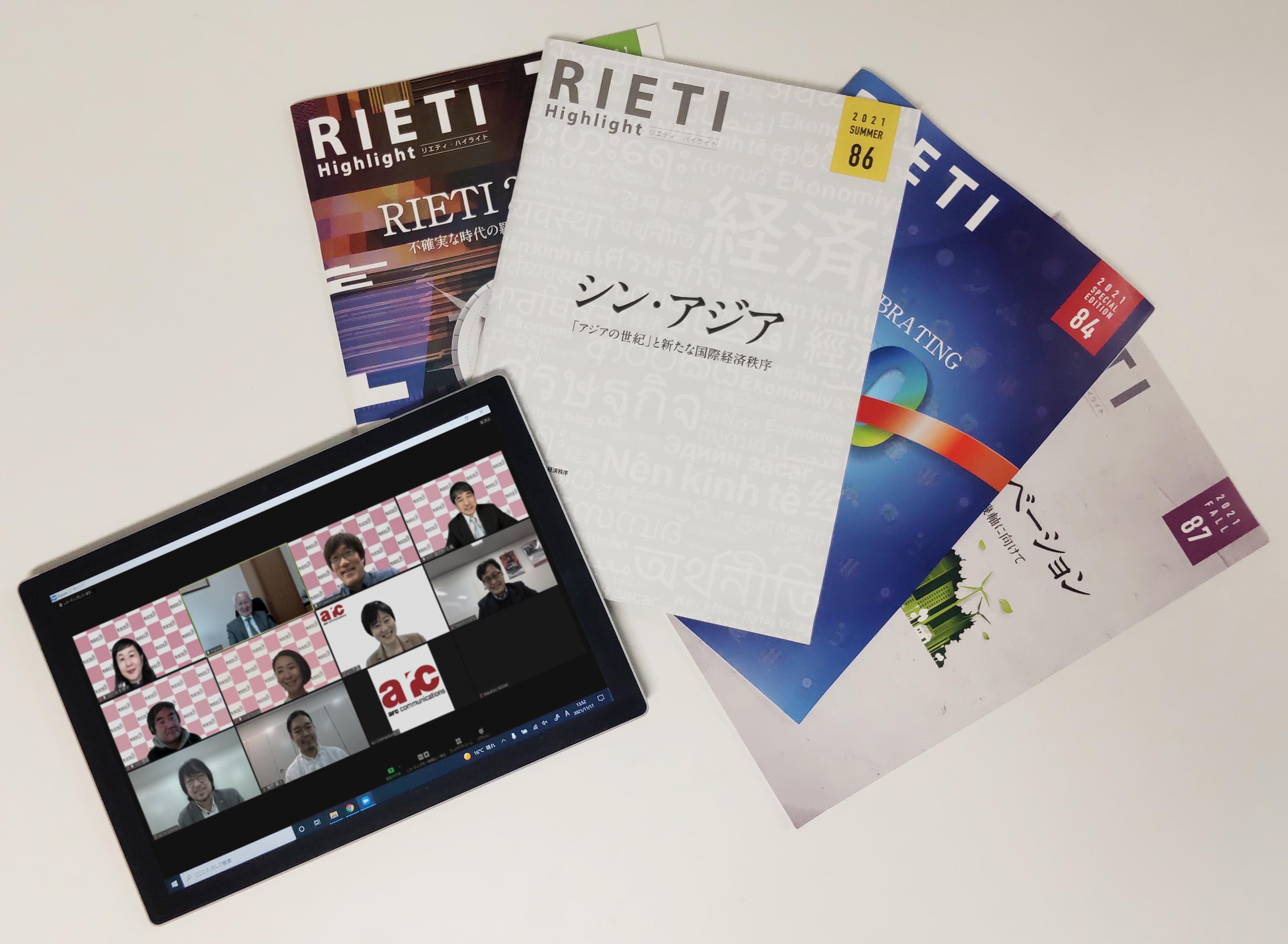
- Profile
- Makoto Yano: Chairman, Trade and Industry, Research Institute of Economy
- Masataka Saburi: Deputy Director of PR Strategy, Trade and Industry, Research Institute of Economy
- Toko Tanimoto: Deputy Director of PR Strategy, Trade and Industry, Research Institute of Economy
- Takehiro Watanabe: Public Relations Office, Trade and Industry, Research Institute of Economy
- Mashu Miyazawa: Public Relations Office, Trade and Industry, Research Institute of Economy
- Yuko Toyota: Public Relations Office, Trade and Industry, Research Institute of Economy
- Mariko Ohsato: CEO & President, Arc Communications Inc.
- Yoshihiro Sato: Operating Officer, Web & Cross Media Executive Manager, Arc Communications Inc.
- Koichi Ogawa: Designer, Web & Cross Media, Arc Communications Inc.
 Designer, Web & Cross Media, Arc Communications Inc.
Designer, Web & Cross Media, Arc Communications Inc.
20 Years of Advocating for Evidence-Based Economic Policies
Ohsato: First of all, congratulations to the Research Institute of Economy, Trade and Industry (RIETI) on its 20th anniversary. As you look back over these 20 years, please tell us about RIETI's role and achievements.
Yano: Thank you. We are truly grateful to Arc Communications for always helping us with the public relations magazine, RIETI Highlight. I can tell that a lot of effort is put into the cover, articles and overall layout, and I'm always very pleased with the cover designs that match the feature articles of each issue. Our whole team is also grateful for how you flexibly work around the production schedule. We hope you can continue to help us going forward, in those areas and beyond.
Ohsato: Thank you very much for your kind praise. That's very encouraging to hear.
Yano: Now then, allow me to briefly talk about RIETI's role and significance.
Over these 20 years, RIETI has functioned as a new kind of policy-making platform that conducts world-class policy research and makes policy proposals. In particular, we have recently been working on promoting evidence-based policy making (EBPM). Until now, Japan has tended to be cautious and old-fashioned when creating policies, relying on past experiences and instincts. We have advocated, instead, for creating policies that are verifiable and based on data and evidence.
During the second Abe administration, the government began to clearly pursue EBPM, so we are very happy that the concepts we have continuously been promoting are starting to take root within the government. In particular, policy-making based on evidence put forward by economists is growing among young officials in charge of creating policies. As that is precisely one of the things we have been striving to achieve, we are very pleased. Since joining RIETI, I have been President (head of research) for four years and Chairman (head of the organization) for a little less than two years. But I feel that these achievements were only made possible thanks to the efforts of our predecessors.
Ohsato: I've heard that new initiatives and research themes have been established since you joined RIETI. Could you tell us what you're focusing on in particular?
Yano: A lot of things, but for example, there's the integration of arts and sciences. One of the biggest issues we see in Japan is that people from backgrounds in the arts and sciences aren't cooperating with each other across the economy as a whole. For example, we often hear the words "technological reform" and "innovation" these days. But extricating those terms from pure theory and implementing them into actual organizations is going to be difficult if the process isn't based on a mutual understanding between the arts and sciences.
Ohsato: I heard that you are applying the integration of arts and sciences in research on COVID-19 that you're involved in as a researcher. I can see how the integration of arts and sciences approach is very important in issues like COVID-19, which affect a broad range of fields.
The Significance of Publishing the Public Relations Magazine in Paper Format
Sato: Could you introduce RIETI's quarterly public relations magazine, RIETI Highlight, which we help produce?
Tanimoto: We began publishing RIETI Highlight in January 2005 as a way to introduce our research findings (such as research papers), as well as symposium and seminar results, in an easily digestible manner. At first, it was a thin booklet, hand-made by the public relations staff. Later on, we received help from Arc Communications and other professionals, which led to creating the handsome magazine we offer today.
Sato: Could you tell us about the editorial policies for RIETI Highlight?
Saburi: When putting together RIETI Highlight issues, we think about how we can get as many people as possible to read about our research findings. Policies are like medicines that cure society's illnesses, and our research findings are one such medicine. Therefore, to get people to take the medicine, it's important to think about how we can deliver it to as many policymakers and other people as possible, how to present the materials so that they can be properly understood, and furthermore, how to get readers to agree. We make an effort to use logical sentences and expressions that are easy to understand, and we also try to be creative with how we show diagrams and tables. But that's still difficult to do.
We believe paper format magazines like RIETI Highlight are important in this digital age. There are many people who prefer paper. For example, when we go to interview companies, many people in their offices pick up the magazine and take an interest in it. They read it, pass it around and enjoy it a lot, sometimes even showing it to their families. The magazine also functions as a business card when we meet new people. Having the magazine at hand is, in a sense, the ultimate form of being mobile, since it can be used immediately without doing a search online. I believe being able to physically touch and feel it leaves a more vivid impression in people's memories too.
Teamwork Between the Editorial Department and Arc Communications
Sato: I'm sure your staff members face a lot of challenges, but are there any episodes that stand out?
Watanabe: The first time I worked with the Arc Communications team was on the English edition of RIETI Highlight. We wanted it to look similar to English language magazines and made a lot of requests to that end. In response, you looked into journals like the Harvard Business Review for us and offered various samples for fonts and paragraph designs. The layout that you proposed at the time has become the basis of RIETI Highlight's English edition.
Miyazawa: This isn't really about a struggle, but I joined RIETI in 2010, and when I look at the magazines published back then and compare them with recently published magazines, I feel that there's a nice consistency to the mood and taste of Arc Communications' work. We've worked with other production companies in the past, but there's a distinct and consistent "Arc touch" in the issues you helped us create.
What has been a struggle, on the other hand, is trying to stick to our schedule. As we mull over cover ideas and try to compile stories that have been, or will become, hot topics, we always seem to fall behind schedule. The Arc team helps us out by adjusting the schedules, sending us frequent reminders, and doing a really good job at taking the reins of the project, so to speak. Thanks to that, we're able to come up with really great issues every time.
Toyoda: I'm in charge of the English edition of an annual public relations magazine that covers RIETI's work over the past year. But since we try to include the most up-to-date information, we tend to run on a very tight schedule. Moreover, since we work with English text that has been translated from the original Japanese, it sometimes doesn't all fit on the page, or we end up needing to forcefully squeeze in the tables. Whenever that happens, Mr. Ogawa, who handles our project on the Arc side, always says, "It's okay" and often solves the problem through design. We're very grateful for this. That reassuring "It's okay" is what gets us through each issue (laughs). Thank you so much.
Memorable Cover Designs and the Joy of Making Them
Yano: The cover for the 20th anniversary issue (Vol. 85) was particularly well received, and many of our readers and people involved said it was brilliant. It is, indeed, very memorable. I could tell you designed it with that very intention. Thank you.
 We're very glad to hear it was well received. Since the subtitle for the 20th anniversary issue was "Being a Compass in the Age of Uncertainties," it was easy to come up with a design concept that featured the well-recognized image of a compass as the theme. The first proposal we made for the cover went right through.
We're very glad to hear it was well received. Since the subtitle for the 20th anniversary issue was "Being a Compass in the Age of Uncertainties," it was easy to come up with a design concept that featured the well-recognized image of a compass as the theme. The first proposal we made for the cover went right through.
Ogawa: Simply showing a compass against a backdrop of the sea or sky to represent being a compass in the global age is something anyone would come up with. We felt it wasn't interesting or unique enough. So instead, we decided to represent the "age of uncertainties" with a background depicting pixelated noise in the digital age. I think that's what made the cover unique. To be honest, we thought you would choose a different idea, but part of what makes this job so fun is being proved wrong (laughs).
Sato: I must say, creating the magazine's cover is the most difficult, but also the most fun part of this project. For every issue, we skim through the special feature topic and the other articles to come up with ideas for the design concept. But some topics are harder to design than others. For example, Vol. 86 was "New Asia: The Century of Asia and a New Global Economic Order." At first, we could only think, 'New Godzilla?' (laughs). We had no idea where to start. In the end, we featured the word "economy" in different Asian languages to express the diversity and order of Asia and the global world. I doubt we would have been able to come up with that idea if we weren't a translation company (laugh). We get very excited every time we're informed of the next issue's topic. There's also so much to do and it's pretty thrilling work, so we're always looking forward to this project.
Ohsato: I personally hope that this project conveys our passion for both research and its publications. I believe research will make the world a better place, and I feel strongly about it. So we try to come up with creative and imaginative ways to deliver little-known research to readers in the general public through publication. Nothing makes me happier than being able to help deliver RIETI's research to as many people as possible, which in turn can help change the world.
Yano: This has been a great opportunity. I learned a lot today. I got to hear about what our staff members are working on and the struggles they overcome. Thank you very much. Hearing you say that research is important was very encouraging. I believe organizations like ours are supported by people who think like you. I hope you can continue to support us in the future and that we can keep fostering our positive work relationship.
Ohsato: Thank you for your precious time today. I hope we can continue to be a valuable asset to you going forward.
-------------------------
Contact point for RIETI
Research Institute of Economy, Trade and Industry (RIETI)
Need help with a translation or interpreting project? Feel free to contact us here.
Arc Communications
Feature Interview Index

